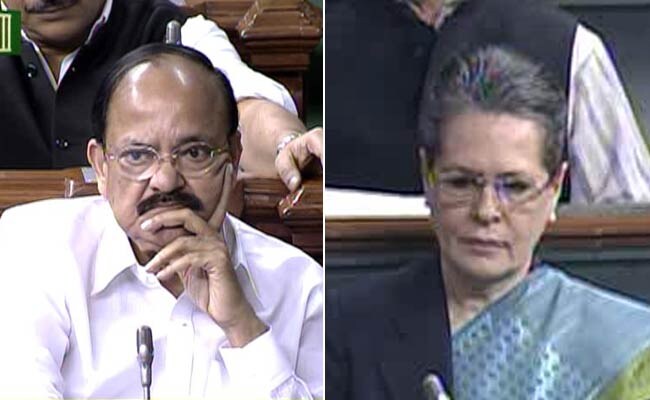
Union Minister Venkaiah Naidu met with Congress President Sonia Gandhi at her residence this morning and said the government is willing to accommodate her party's demands on GST.
New Delhi:
To rescue a key reform from cold storage, the government today reached out to Congress leader Sonia Gandhi and offered to call an early parliament session if her party is willing to support the national Goods and Services Tax (GST).
Union Minister Venkaiah Naidu met with Mrs Gandhi at her residence this morning and said the government is willing to accommodate her party's demands on the proposed reform, which replaces a slew of federal and state levies with one tax, effectively creating a unified market place.
The Congress, which championed the measure when it led the UPA coalition government, has so far refused to back what it calls a "flawed" GST, demanding lower rates and a simpler structure.
It wants the government to cap the rate of GST at less than 20 per cent, scrap a proposed state levy and create an independent mechanism to resolve disputes on revenue sharing between states.
Last month, before the winter session of Parliament ended, Finance Minister Arun Jaitley said the demand to scrap the state levy was "fair and arguable" and he was ready to compensate states if cancelling the levy resulted in revenue losses to them.
"This 1 per cent (levy) issue is resolvable," he told a meeting of business chambers.
While the new tax is widely expected to add up to two percentage points to economic growth by supplanting a chaotic structure that inflates costs for businesses, it has been languishing in Parliament for a year.
The Finance Minister has said that standard rates under the new tax would be less than 18 per cent, in a bid to address the Congress' concerns that a higher tax rate would be inflationary, make Indian businesses uncompetitive and encourage tax evasion.
The budget session of Parliament is meant to begin in last week of February. Suggesting an earlier start, the government hopes to meet the April 1 deadline for a nationwide launch of the sales tax.
Parliament's approval will set in motion steps towards rolling out the GST, but several more hurdles must be passed before it can be adopted - at least half of the states must vote in favour of the proposal before it becomes a law.
Union Minister Venkaiah Naidu met with Mrs Gandhi at her residence this morning and said the government is willing to accommodate her party's demands on the proposed reform, which replaces a slew of federal and state levies with one tax, effectively creating a unified market place.
The Congress, which championed the measure when it led the UPA coalition government, has so far refused to back what it calls a "flawed" GST, demanding lower rates and a simpler structure.
It wants the government to cap the rate of GST at less than 20 per cent, scrap a proposed state levy and create an independent mechanism to resolve disputes on revenue sharing between states.
Last month, before the winter session of Parliament ended, Finance Minister Arun Jaitley said the demand to scrap the state levy was "fair and arguable" and he was ready to compensate states if cancelling the levy resulted in revenue losses to them.
"This 1 per cent (levy) issue is resolvable," he told a meeting of business chambers.
While the new tax is widely expected to add up to two percentage points to economic growth by supplanting a chaotic structure that inflates costs for businesses, it has been languishing in Parliament for a year.
The Finance Minister has said that standard rates under the new tax would be less than 18 per cent, in a bid to address the Congress' concerns that a higher tax rate would be inflationary, make Indian businesses uncompetitive and encourage tax evasion.
The budget session of Parliament is meant to begin in last week of February. Suggesting an earlier start, the government hopes to meet the April 1 deadline for a nationwide launch of the sales tax.
Parliament's approval will set in motion steps towards rolling out the GST, but several more hurdles must be passed before it can be adopted - at least half of the states must vote in favour of the proposal before it becomes a law.
Track Latest News Live on NDTV.com and get news updates from India and around the world

